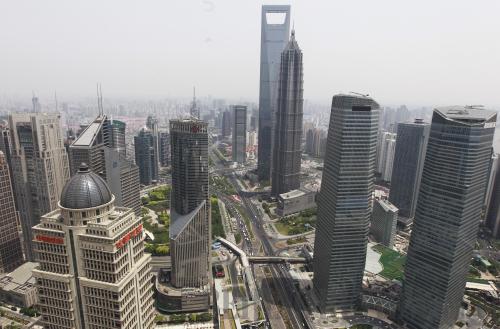|
 |
|
RISING SKYLINE: The Lujiazui Financial District in Shanghai (PEI XIN) |

The debate over the "China Model" is currently a topic of intense interest. In a recent written interview with foreign media, Chinese President Hu Jintao responded by praising China's political model. His affirmation, reiterating China's commitment to socialism with Chinese characteristics, demonstrated a level of confidence fitting for a large country. It also served to address the concerns of the academic world and the public in explicit terms.
But what has made the Chinese political model so successful? What defines it as a successful model? And how will it evolve?
The benchmark for judgment
There is no such thing as the best political system. Likewise, the world will never be totally dominated by a universal political system. Political systems come in a diverse range of forms. They coexist, borrow from each other and compete with one another. The emergence of this dynamic situation is closely related to several major changes that took place in the world's population and the layout of nations after World War II. First, the world's population has increased significantly since the end of the war, from around 2.4 billion to nearly 6.8 billion at present. Second, the number of countries and regions in the world has increased substantially, shooting up from 45 to more than 200. There are two principal reasons for this: the successive independence of colonial countries after the end of World War II and the disintegration of East European countries like the Soviet Union and Yugoslavia after 1990. Third, as the average population per country has dropped from 53 million to 35 million, the difficulty of running a state has decreased comparatively, and national economies have become more dynamic as a result. Fourth, the rapid integration, regionalization and globalization of the world economy have brought about increasingly intense competition between nations throughout the world. In the midst of such fierce international competition, slow movers are as likely to fail as those who do not progress at all. In essence, the market competition and technological competition that ensue between states boil down to competition between the different systems that they employ. It should be noted the outcome of this competition is not decided by the inherent merits of any given system alone, but by how well a system performs in relation to its competitors.
China's population has risen from almost 500 million in 1945 to 1.3 billion today. In the same time, China has changed from a poor, backward and disunited nation into a vibrant, prosperous and united global power. But how has China been able to govern itself so successfully? And how should we view China's success in an international context in order to further demonstrate the suitability and success of its political system?
We cannot rely on our own subjective judgment to do this, nor can we turn to Western values to make such a judgment for us. Instead, we must let the numbers and the facts speak for themselves. By "success" we mean something specific—the term is not being used in its abstract sense. We cannot gauge success on the basis of a single standard, and respective issues, examples and indexes must be viewed specifically in their own contexts. Moreover, "success" cannot be proclaimed on the basis of self-appraisal. It must be confirmed through a process of comparison with other countries.
Our discussion will revolve around two aspects: The first is a long-term developmental comparison between more than 100 countries and regions over the past 30 years (1978-2008), while the second is a short-term comparison that will look at how G20 countries have coped with the international financial crisis over the last three years (2008-10). These comparisons will endeavor to show China has done better than any other country and its performance is not be matched anywhere else.
China's political system is not without its shortcomings. Despite this, both historical facts and international comparisons have demonstrated it is suited to China's basic national conditions and to its current stage of development. Likewise, China's political system has also proven its adaptability to an increasingly open internal and external environment. It is able to cope with various external challenges and demonstrates clear developmental advantages and a unique edge in the course of fierce international competition. This has been achieved by China's efforts to restructure and reform its political system over the past 30 years. First, China has developed a set of codes, regulations and processes to govern the transition between its national leaders, which has ensured the stability and continuity of its political leadership. Second, China's leaders have adhered to the line of "seeking truth from facts." Third, China has developed a democratic, scientific and regulated approach to public policymaking. These are the fundamental reasons why China has been so successful.
|
